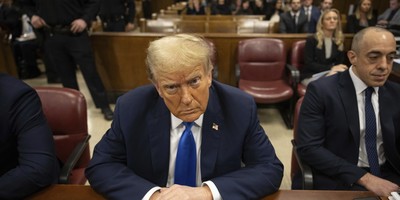Two centuries ago, when there were plans to create a huge fund of money to pay off Britain's national debt, the great classical economist David Ricardo objected on grounds that-- no matter what the money was said to be for-- politicians could spend it for whatever they wanted.
Two centuries later, we have not yet caught up to that plain reality, even though the $700 billion that was supposed to be used to rescue financial institutions has already begun to be spent on other things.
Regardless of what President Bush or Secretary of the Treasury Paulson may have had in mind when they promoted this huge bailout package, with all due respect to these gentlemen what they had in mind will not matter in the slightest after January 20th.
All that money is just a gift to the Democrats to spend in whatever ways will advance the interests of their constituents and of the Democratic Party.

It was not just a gift of money-- huge though that is-- it is also a gift of exemption from Republican criticism, even for the bailout of General Motors, which President Bush began, even when Congress refused to give GM the money without preconditions. It is a political get-out-of-jail-free card that can cover whatever disasters the Democrats create on their own in the years ahead.
The whole idea behind the "stimulus" package begins to look more and more dubious as the outlines of the policy begin to take shape.
Take the idea that much of this money will be spent on "infrastructure." This certainly sounds good-- until you stop and think about it. So do most political notions.
Does spending on infrastructure mean that the money is going to be spent filling potholes and repairing bridges? Or will it be spent creating new things?
Recommended
One of the key reasons why infrastructure gets neglected, in the first place, is that there is very little political pay-off to filling potholes and repairing bridges, compared to spending that same money creating community centers, bike paths and other things.
These new things create opportunities for ribbon-cutting ceremonies that give politicians favorable free publicity in the media. But nobody holds ribbon-cutting ceremonies for filling in potholes or repairing bridges.
The whole process is biased toward doing new things, even if the repair and maintenance of existing infrastructure would serve the public interest better.
But, even in the unlikely event that the public interest triumphs over special interests, there is another very important difference between repair and maintenance activities, on the one hand, versus building new things on the other.
New things require long delays before they can get started, especially when they have to be done by politicians. Someone once said that Congress would take 30 days to make instant coffee-- and Congress is just the beginning of the delays, as all sorts of competing interests jockey for position at the public trough.
Just putting together an environmental impact report for something new to be built can be a long process, especially if its findings are challenged by environmental extremists, who pay very little price for challenging, even if the delays caused by their challenges cost others millions of dollars.
In short, it can be years before the money that is supposed to stimulate the economy actually gets into the economy. And nobody knows what the economy will be like when that money finally gets into circulation.
A common problem with government economic policies in general is that it is very hard to predict how long it will be before the policy actually affects the economy. An economic stimulus policy created during a contraction in demand can take effect during an inflationary expansion of demand-- and fuel still more inflation.
A trillion dollars or so, created out of thin air by a government that already has a huge deficit, can set off another round of inflation that can take some very painful new policies to bring under control-- or can have even more painful effects, if it is not brought under control. The new administration may need that get-out-of-jail-free card.

























Join the conversation as a VIP Member